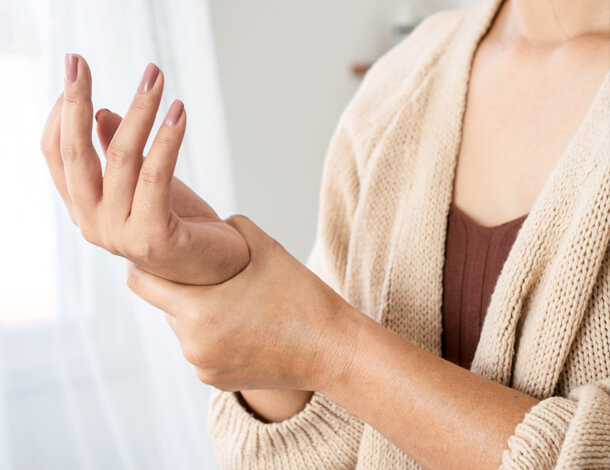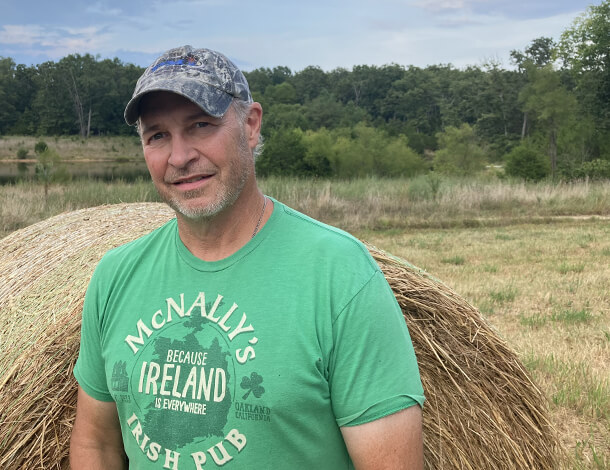Treatment for Parsonage-Turner Syndrome Helps Young Professional Hold on to What Matters Most
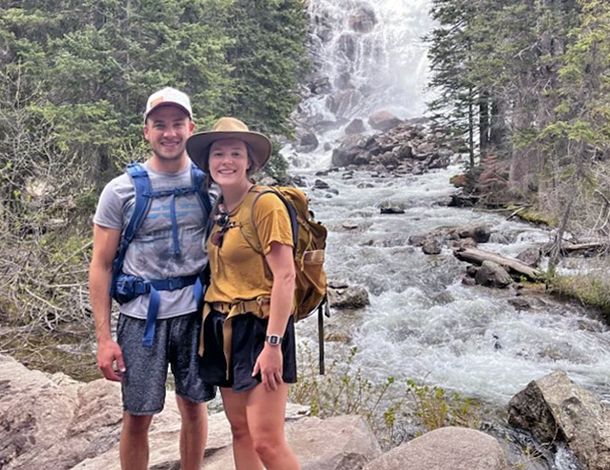
When your wrists are working, it’s easy to make simple movements without a second thought. But when this critical joint starts to fail, everything gets harder to do. When 27-year-old Katie B. noticed her wrist weakness wasn’t going away, she knew she had to act and got treatment for Parsonage-Turner syndrome from the nerve specialists at Indiana Hand to Shoulder Center.
This is her story.
Kate B.’s patient story
Hometown: Carmel, IN
Age: 27
Out of Touch
At first, I thought I was just being clumsy because I was dropping things more often.
It was May last year when I first noticed something was off. I was working as a teacher. Not being unable to extend my wrist meant I couldn’t even point while explaining something to my students.
Outside the classroom, my wrist weakness complicated my life, too. I tried to play flag football, but that didn’t work out well. I also couldn’t lift weights anymore or play the violin.
My wrist would give out when I tried to pick something up. Being unable to use my wrist normally touched every aspect of my life. I felt like I only had one and a half hands because of my Parsonage-Turner syndrome symptoms.
Initial Diagnosis
I decided to talk to my brother, who is a PA. He did some tests, evaluated my wrist weakness, and told me he thought something was wrong.
I didn’t know what to do, so I first made an appointment to see a general orthopedic doctor at a different practice. The initial doctor I saw confirmed that my wrist weakness wasn’t typical. He ordered some EMG tests and referred me to a surgeon with experience treating peripheral nerve conditions. That second specialist ordered more EMG tests as well as an X-ray and traditional MRI covering my entire left arm, from shoulder to fingertips.
Based on the images of my arm, he recommended decompression surgery but told me he wasn’t confident that it was the best option. He told me he couldn’t guarantee it would help my wrist and wanted me to feel confident before scheduling surgery. So he recommended that I get another opinion from a specialist with more experience treating peripheral nerve conditions and referred me to Dr. Hoyer at the Indiana Hand to Shoulder Center.
Expert Second Opinion
The first thing Dr. Hoyer did was give me peace of mind.
He ordered an MRI designed to specifically detect changes to nerves to get a clear-cut look at what was happening inside my arm since my other MRIs were too basic to show anything conclusive. They only revealed I had some swelling in the area. The specialized MRI revealed that there was a serious problem.
Dr. Hoyer showed me the images from my MRI and told me that my nerve was three or four times bigger than it should be.
Suspecting I had Parsonage-Turner syndrome, he referred me to Dr. Greenberg, Dr. Peck, Dr. Smetana, and Dr. Puri at the IHTSC Nerve Clinic for diagnosis and treatment.
“The Best Care Available”
I was really optimistic before my first appointment. Knowing I was going to get to have multiple doctors collaborate and determine the best way to solve what was happening gave me confidence that the IHTSC Nerve Clinic was where I needed to be to get proper treatment for Parsonage-Turner syndrome finally.
I felt lucky. I knew I had miraculously found a team of Parsonage-Turner syndrome specialists who could give me the best care.
My most significant stressor to date had been not knowing:
- how to find the perfect doctors,
- how many opinions I should seek out, and
- how to juggle the logistics of scheduling to see a bunch of different specialists.
Getting in at Indiana Hand to Shoulder Center solved all of those worries.
One cool thing about the Nerve Clinic was that I could see multiple doctors simultaneously. I loved knowing I had finally found the best care and a way to make it all work.
Experts With Empathy
I was a little unsure what an appointment at the Nerve Clinic would look like. I wasn’t used to seeing a bunch of doctors all at one time.
But, instead of it being overwhelming, each appointment was really nice. The demeanor of each doctor was empathetic. They didn’t just want to fix my problem. They wanted me to feel cared for as a person, which makes such a difference when you’re in a scary, unknown situation like I was.
I felt well cared for from start to finish during my evaluation, surgery, and treatment for Parsonage-Turner syndrome.
Surgery for Parsonage-Turner Syndrome
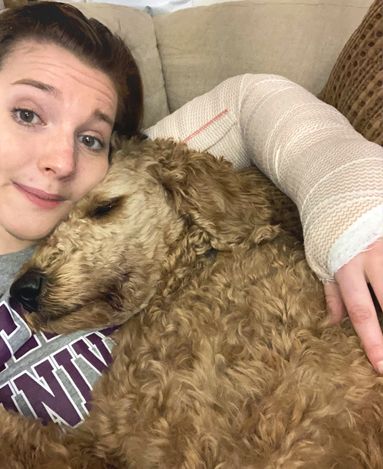
Dr. Puri and Dr. Greenberg met with me before I went under. I was nervous, but they put me at ease. They were both calming and confident, which helped lower my anxiety. They made me feel like they weren’t just interested in doing my surgery because they were curious about fixing my medical problem.
Some doctors can make you feel like a research animal, but Dr. Puri and Dr. Greenberg made me feel important. They were so helpful, and it was clear they really cared about me. I appreciated that so much.
The surgery itself ended up being more in-depth than anticipated. I was in a huge bandage for ten days, and—as soon as it came off—my finger extension started to come back.
The surgery quickly resolved many of my problems with functionality, and going to occupational therapy helped me build back major muscle groups that were weakened by my surgery.
I was amazed to be at like 85–95% at the two-week mark. I was healing far and away faster than anyone anticipated.
A Firm Hold on Life Again
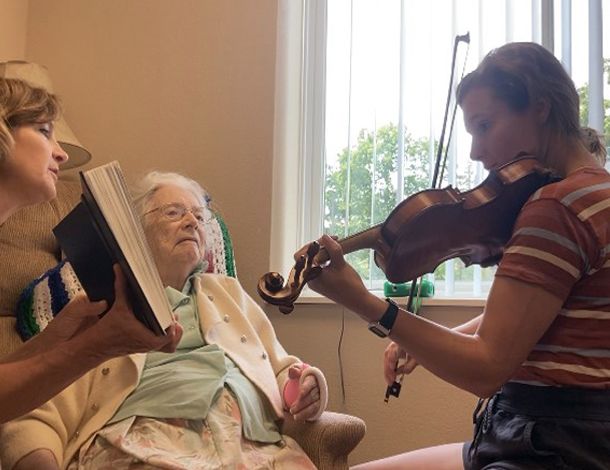
Today, I’m doing great. I’m back to full functionality. I can do all my favorite hobbies again and even little things around the house.
Not being able to play the violin again was the biggest thing I was worried about, but I’m playing again weekly.
When I came in for a check-up after my surgery, Dr. Greenberg seemed more excited than I was that I could play my violin again. They were all so great.
It’s the Little Things
One thing that sticks out for me about my experience is that every encounter I had gave me confidence. Everyone took so much time with me and answered my questions.
I always felt cared for at the IHTSC Nerve Clinic.
For instance, one time, I came in right away after a long day at school. Dr. Peck, who remembered I was a teacher, figured I might have arrived at my appointment hungry, so she brought me some Goldfish crackers and water when she entered the room to meet with me.
Having wrist weakness was stressful, and small gestures like that helped put me at ease.
Why Choose IHTSC’s Nerve Clinic
If anyone I knew had issues similar to the problems I experienced, I wouldn’t hesitate to recommend the Nerve Clinic at Indiana Hand to Shoulder Center. In fact, I would say, “Oh my gosh—you need to go!”
Everyone involved in my Parsonage-Turner syndrome treatment was knowledgeable, helpful, and kind. I couldn’t have had a better experience or a more positive outcome.
If you have lost mobility and have nervousness about seeing a specialist, know that the doctors at the Nerve Clinic are experts and can help. They will support you through decision-making and give you confidence.
I can only give the most glowing review to everyone at the Nerve Clinic.
Thank you, Dr. Greenberg, Dr. Peck, Dr. Smetana, and Dr. Puri.
Do You Need Treatment for Parsonage-Turner Syndrome?
Not all patients require surgical procedures to manage and heal wrist weakness caused by Parsonage-Turner syndrome, but for some patients—like Mary B.—having surgery may be recommended.
Every patient’s needs are different. Make an appointment with an experienced nerve pain specialist for specific recommendations on what is best to help your wrist heal.
Experts in Treating Wrist Weakness Caused by Nerve Pain
Since 1972, patients across Indiana and throughout the U.S. have trusted Indiana Hand to Shoulder Center’s world-class upper extremity surgeons.
“If anyone I knew were having issues similar to the problems I experienced, I wouldn’t hesitate to recommend the Nerve Clinic at Indiana Hand to Shoulder Center.”—Kate B., Indiana Hand to Shoulder Center patient
How Do I See an IHTSC Nerve Specialist?
Request an appointment today, and take the first step in managing pain from Parsonage-Turner syndrome and nerve conditions.
Prefer to schedule by phone? Call us at (317) 751-5904.
You Might Also Like …
Disclaimer: The materials on this website have been prepared for informational purposes only and do not constitute advice. You should not act or rely upon any medical information on this website without a physician’s advice. The information contained within this website is not intended to serve as a substitution for a thorough examination from a qualified healthcare provider. The display of this information is not intended to create a health care provider-patient relationship between the Indiana Hand to Shoulder Center and you.


